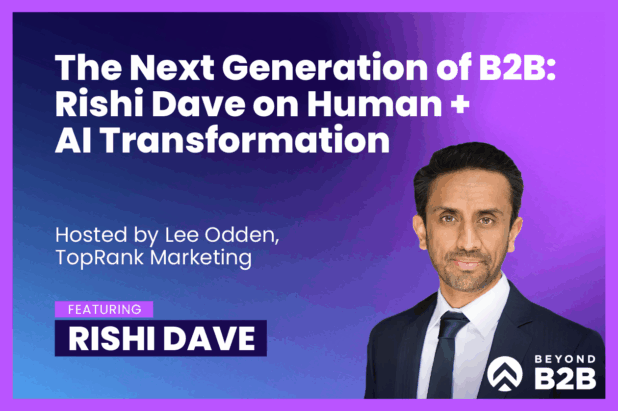 Companies large and small are investing in content creation now, more than ever. Whether the investment in content marketing supports branding, sales, customer service, PR or recruiting, there are specific audiences and brand messages involved.
Companies large and small are investing in content creation now, more than ever. Whether the investment in content marketing supports branding, sales, customer service, PR or recruiting, there are specific audiences and brand messages involved.
Kudos to companies making the effort to create more useful content to help answer customer questions. But what good is investing in all that content if it’s not easy to find and share?
Search is a direct expression of intent and what better time for your useful content to be available than at your customers’ moment of need? It’s the perfect time of course, so companies pumping out content without amplification are literally throwing money away.
To help content marketers get a better handle on how SEO fits with content marketing, Joe Pulizzi and the folks at Content Marketing World hosted a Twitter Chat with me on the topic. In case you missed it, here are my self-curated tips:
Q1: Let’s get started! In the ever-changing world of search, what are basics content marketers should keep in mind?
A1: Search is instrumental for discovery so content marketers need to know how their customers search, what & why
A1: Search insights inspire content topics customers are actively looking for. What better way to connect?
A1: Google Keyword Tool will soon require an AdWords acct, but ubersuggest.org & wordpot.com are handy (free)
A1: Distill customer interest along buy cycle into keywords/topics that inspire content & optimization. Refine, repeat.
A1: Continuous optimization of search performance enables content to keep pace with changes in the search world.
Q2: How does #contentmarketing create synergy between search and social?
A2: Social is jelly, SEO is peanut butter, & content marketing is the bread that holds it all together 🙂
A2: Content that is easy to find in search & easy to share on social networks is a good customer experience.
A2: Useful content shared on social networks helps people & provides a signal for search engines. Win Win Win
Q3: How do you balance #SEO keywords (search) & keywords consumers use (social)?
A3: Search phrases express specific intent to find. Social topics expect interaction or reaction
A3: Keyword tool for search: Topic tool for social: social monitoring tools Sysomos Heartbeat
A3: Tools like the new FB Graph Search show that searching is an essential function for consumers
A3: Search keywords & social topics can inspire a content plan that is optimized & socialized for visibility
Q4: What tools should content marketers use when it comes to #SEO?
A4: Keyword research tools: Google Keyword Planner, Wordstream, Wordtracker, Keyword Discovery
A4: Competitive research tools: SEMRush, SpyFu
A4: Onpage Optimization Tech Audits: Screaming Frog, Xenu LinkSleuth
A4: Link tracking tools: AHrefs, MajesticSEO, Moz
A4: Content optimization guides like Inbound Writer, ScribeContent
A4: SEO management tools like RavenTools, Optify, BrightEdge
Q5: Is there one kind of content – video, text, images, mobile – that is prime for search? What’s the hot trend?
A5: It’s possible to say images & video are “hot” but not necessarily relevant for all experiences
A5: Create the content mix most meaningful for your customers, then optimize for fundability
A5: Picking the most popular content solely by the format prime for search, can create a disconnect
Q6: What process does your organization use to optimize its content?
A6: That’s the question everyone wants to know 🙂 It’s outlined in detail within OptimizeBook.com
A6: Buyer Goals > Keywords > Content Plan > Optimize > Socialize > Publicize > Convert
Q7: How do you change your search strategy based on how Google changes its algorithm?
A7: A search strategy that has to change significantly due to an algorithm update is a failed strategy to start with
A7: The focus should be on customers, conversions and optimizing against that. Defensible content that adds value
Q8: Do you optimize your content for both your audience and search? Which is more important?
A8: Optimizing for customers is first & foremost important. What does that mean? Be meaningful to customers.
A8: Content easily found but confusing is of no value. Neither is excellent content no one can find.
A8: Meaningful content for customers that is also optimized for discovery – search or social is the WIN
Q9: Last question: What do you think is the future of SEO/search? Will it become more or less important?
A9: A10: As long as content can be found through the act of searching, there will be an opportunity for optimization.
A9: When marketers are focused on the customer journey, the most important content discovery channels are always clear.
To connect with some of the smartest and possibly, good looking, content marketers in the world, be sure to check out the Content Marketing World conference coming up in September. I’ll be there with three of my team connecting, networking, speaking and definitely learning. We hope to see you there.
Update! Here’s a SlideShare deck from Content Marketing Institute of the #CMWorld Tweet Chat:


